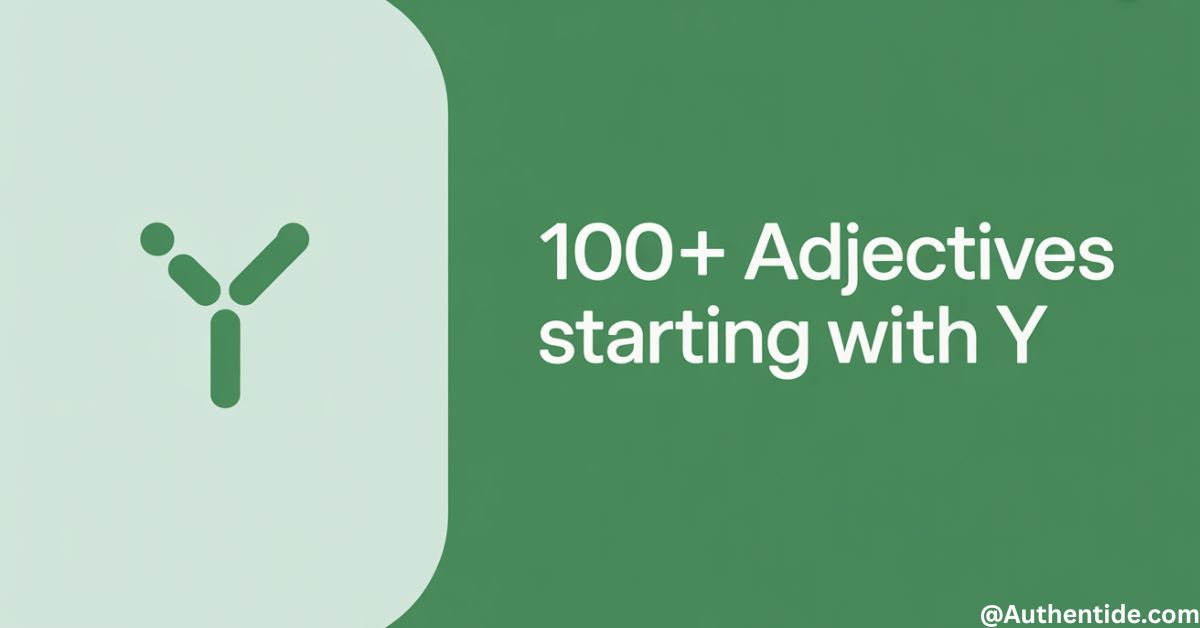Y adjectives might seem rare, but they pack serious punch in your writing arsenal. These adjectives that start with the twenty-fifth letter bring vibrancy and precision to everyday communication. Whether you’re crafting a novel or simply want to expand your vocabulary, words that start with Y offer unique ways to express yourself.
Many writers overlook these gems. That’s unfortunate because Y-based adjectives can transform bland sentences into compelling narratives. From describing personalities to painting vivid scenes, these descriptive words deserve their spotlight.
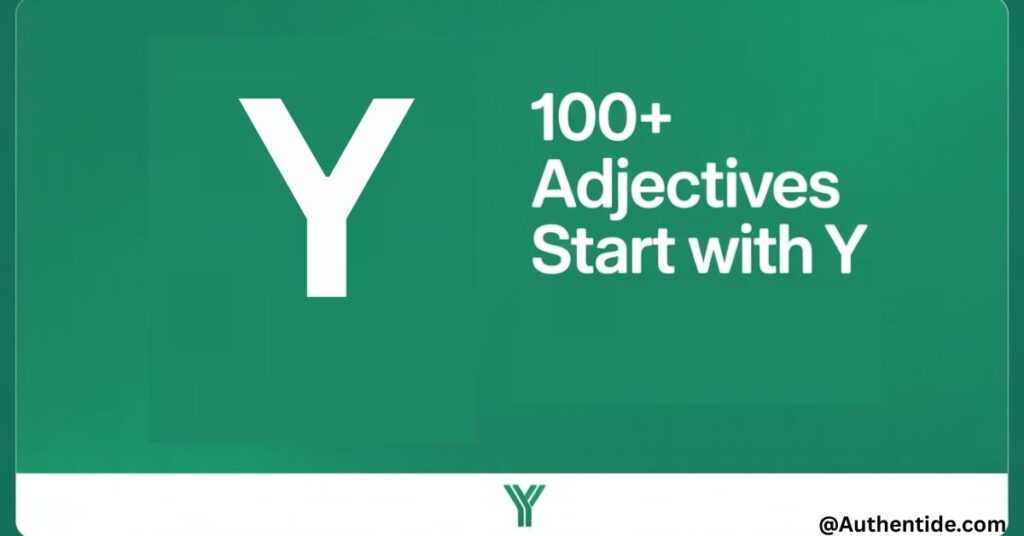
Understanding Y Adjectives and Their Impact
Adjectives beginning with Y span various categories. Some describe physical appearances. Others capture emotions or character traits. The versatility surprises most people.
Consider how “youthful” differs from “young.” Both reference age, but “youthful” suggests energy and vitality beyond mere chronological years. This distinction matters when you want precision in your expressive writing.
Grammar tips suggest using these adjectives strategically. Don’t cram multiple Y adjectives into single sentences. Instead, choose the most impactful one. Your readers will appreciate the clarity.
Y Adjectives to Describe a Person
Personal traits come alive through carefully chosen descriptors. Character adjectives that start with Y offer nuanced ways to portray individuals. Let’s explore the most effective ones.
Physical Appearance and Age
Youthful tops the list for positive adjectives. It suggests someone who radiates energy regardless of actual age. “Sarah’s youthful enthusiasm infected everyone at the meeting.”
Young remains straightforward but powerful. Use it when age matters to your context. “The young entrepreneur revolutionized the industry.”
Yellowed works for describing aged items or teeth affected by time. “His yellowed photographs told stories of decades past.”
Personality and Character Traits
Yearning captures deep longing or desire. “Her yearning expression revealed unspoken dreams.” This behavioral trait adds emotional depth to character descriptions.
Yielding suggests flexibility or compliance. “His yielding nature made him popular among colleagues.” However, context determines whether this trait appears positive or negative.
Yappy describes someone who talks excessively. “The yappy neighbor shared every neighborhood detail.” Use this carefully it can sound dismissive.
Youthful energy often accompanies other traits. “Despite his eighty years, his youthful spirit inspired everyone.” This combination creates memorable character portraits.
Emotional States and Moods
Yearning emotions run deep. “She felt yearning sadness when viewing old family photos.” This psychological trait suggests complex inner life.
Yellow-bellied historically meant cowardly, though it’s considered outdated now. Modern writers might choose “yielding” instead. “His yielding response disappointed those expecting leadership.”
Yawning can describe both physical action and emotional state. “The yawning boredom in her voice spoke volumes.” This dual meaning adds layers to descriptions.
Character Traits Starting With Y
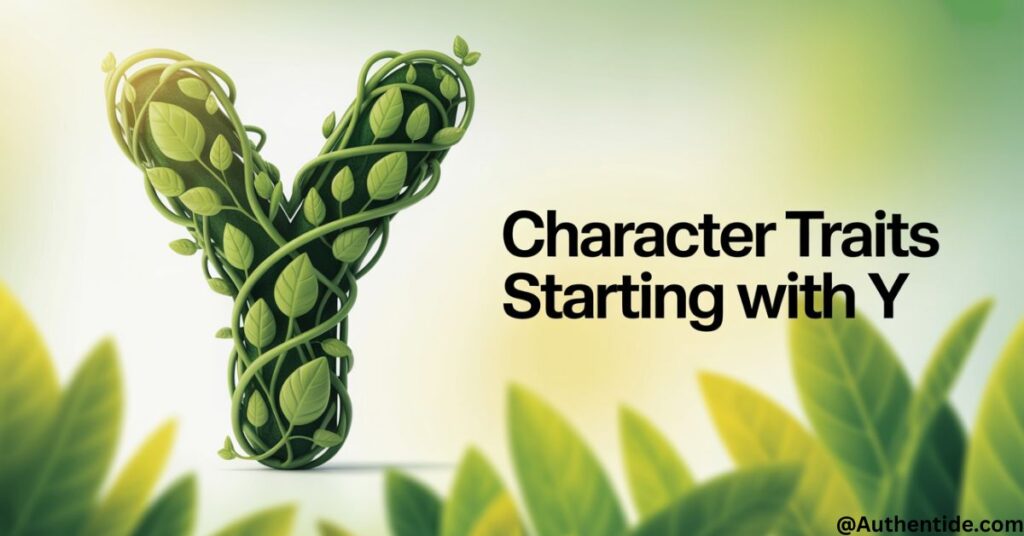
Behavioral traits that begin with Y offer writers rich material. These character attributes help create three-dimensional personalities.
Positive Character Qualities
Yare means quick or agile, though rarely used in modern writing. “Her yare responses impressed the interview panel.” Consider this uncommon terminology for historical fiction.
Yielding can indicate positive flexibility. “His yielding leadership style encouraged team creativity.” Context shapes whether readers interpret this favorably.
Youthful optimism brightens any character. “Her youthful hope never dimmed despite setbacks.” This trait creates sympathetic protagonists.
Challenging Character Aspects
Yappy individuals test patience. “The yappy customer complained about every detail.” This trait works well for antagonists or comic relief.
Yellow (meaning cowardly) appears in older literature. Modern alternatives include “timid” or “hesitant.” “His yellow retreat surprised his supporters.”
Yearning can become problematic when excessive. “His yearning obsession with success destroyed relationships.” This shows how positive traits become negative through extremes.
Complex Character Development
Real people display multiple traits simultaneously. Y adjectives help capture this complexity. “She was simultaneously youthful and wise, yielding yet determined.” This layering creates believable characters.
Character traits evolve throughout stories. A initially yappy character might develop yielding wisdom. These transformations drive compelling narratives.
Comprehensive List of Adjectives That Begin With Y
Here’s an extensive y adjectives list organized by category:
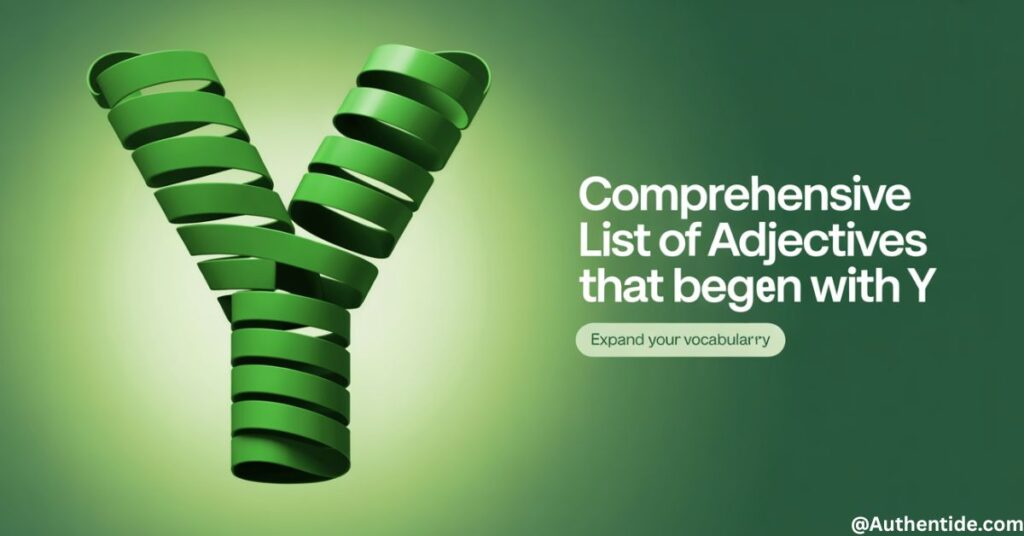
Common Y Adjectives
Yellow – the color or cowardly
- “The yellow sunflower dominated the garden.”
- “His yellow behavior embarrassed the team.”
Young – having lived for a short time
- “Young children adapt quickly to change.”
- “The young couple renovated their first home.”
Youthful – having qualities of youth
- “Her youthful appearance belied her experience.”
- “His youthful energy motivated the entire department.”
Descriptive Y Adjectives for Objects and Places
Yawning – wide open like a yawn
- “The yawning chasm blocked their path.”
- “A yawning gap existed between expectations and reality.”
Yielding – giving way under pressure
- “The yielding mattress provided comfort.”
- “Yielding soil made planting easier.”
Yellowed – turned yellow with age
- “Yellowed pages revealed the book’s age.”
- “The yellowed wedding dress held memories.”
Emotional and Mental State Y Adjectives
Yearning – having intense longing
- “Her yearning heart sought adventure.”
- “Yearning glances passed between the lovers.”
Yawning – showing boredom or tiredness
- “The yawning audience needed entertainment.”
- “His yawning indifference frustrated colleagues.”
Rare and Uncommon Y Adjectives
Yare – quick and agile (archaic)
- “The yare sailor climbed the rigging swiftly.”
- “Her yare wit impressed the audience.”
Yond – over there (archaic)
- “The yond castle dominated the landscape.”
- “Yond mountain peak touched the clouds.”
Yclept – called or named (obsolete)
- “The knight yclept Arthur drew his sword.”
- “The town yclept Willowbrook welcomed visitors.”
Grammar and Usage Guidelines
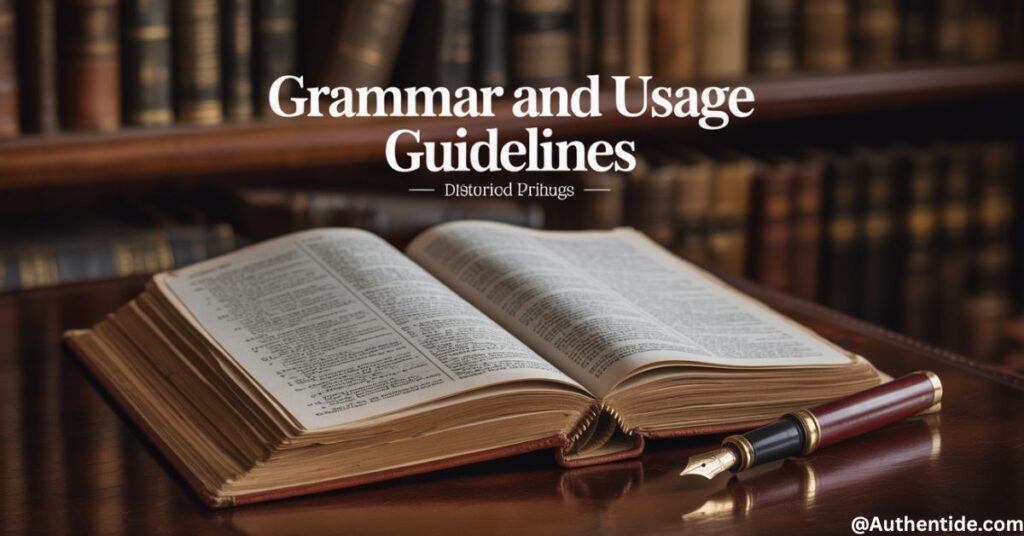
Grammar mistakes often occur when writers misuse Y adjectives. Understanding proper placement and context prevents these language errors.
Possessive Forms with Y Adjectives
Possessives with Y adjectives follow standard rules. However, specific scenarios require attention:
Singular possessive: The young boy’s enthusiasm was contagious. Plural possessive: The young boys’ team won the championship. Possessive with gerunds: I appreciate your being so yielding during negotiations.
Comparative and Superlative Forms
Most Y adjectives form comparatives and superlatives regularly:
- Young, younger, youngest
- Youthful, more youthful, most youthful
- Yellow, more yellow, most yellow
Some resist comparison:
- Yearning (you can be “more yearning” but it sounds awkward)
- Yawning (as an adjective, doesn’t compare well)
Common Grammar Pitfalls
Proofreading tips for Y adjectives include watching for these syntax errors:
- Redundancy: “youthful young person” wastes words
- Misplacement: “The yellowing yawning cat stretched” confuses readers
- Overuse: Multiple Y adjectives in one sentence sound forced
Grammar check tools help catch these issues, but human judgment remains essential.
Bringing Your Writing to Life with Y Adjectives
Engaging writing demands variety. Y adjectives provide that freshness readers crave. They transform ordinary descriptions into vivid writing.
Creating Memorable Characters
Character development benefits from strategic adjective use. Instead of “She was tired,” try “Her yawning exhaustion spoke of sleepless nights.” The Y adjective adds specificity and visual impact.
Personality words starting with Y offer nuanced character portrayal. “His yielding nature masked inner strength” suggests complexity that flat descriptions lack.
Setting and Atmosphere
Y-related words excel at atmospheric description. “The yellowed manuscript lay in yawning silence” creates mystery and age. These descriptive vocabulary choices immerse readers in your world.
Expressive adjectives paint scenes with precision. “Yearning wind whispered through yawning canyons” combines sound, emotion, and geography effectively.
Dialogue Enhancement
Characters’ speech patterns can incorporate Y adjectives naturally. “You’re being yappy again, Sarah,” sounds conversational while revealing relationship dynamics. This creative writing technique adds authenticity.
Behavioral terms in dialogue reveal character quickly. “Stop being so yellow about it!” immediately establishes speaker attitude and relationship tone.
Advanced Techniques for Y Adjective Mastery
Vocabulary builder strategies include studying etymology. Many Y adjectives derive from Old English or Middle English roots. Understanding origins improves usage accuracy.
Etymology and Historical Context
Yellow comes from Old English “geolu,” related to “gold.” This connection explains why yellow suggests both color and value (or lack thereof in “yellow-bellied”).
Young derives from Old English “geong,” sharing roots with German “jung.” This Germanic heritage influences modern usage patterns.
Yare traces to Old English “gearu” meaning “ready” or “prepared.” Knowing this helps writers use it accurately in historical contexts.
Regional and Cultural Variations
American English tends to favor direct Y adjectives like “young” and “yellow.” British English sometimes preserves archaic forms like “yare” in literary contexts.
Cultural context affects interpretation. “Yellow” as “cowardly” carries Western associations that don’t translate globally. Grammar tips suggest considering your audience when choosing culturally-loaded terms.
Professional Writing Applications
Business writing benefits from precise Y adjectives. “Yielding market conditions” conveys specific economic meaning. “Youthful demographics” targets marketing discussions effectively.
Academic writing requires careful Y adjective selection. “Yearning hypothesis” sounds unprofessional, while “yielding experimental conditions” demonstrates scientific precision.
Common Mistakes and How to Avoid Them
Writing issues with Y adjectives fall into predictable patterns. Recognizing these error correction opportunities improves your prose immediately.
Overreliance on Common Y Adjectives
Beginning writers overuse “young” and “yellow.” Vocabulary diversity demands exploring alternatives. Instead of repeatedly using “young,” consider “youthful,” “inexperienced,” or “fresh.”
Word collection building prevents repetition. Maintain lists of synonymous Y adjectives for quick reference during writing assistant sessions.
Misunderstanding Connotations
Y adjectives carry subtle implications. “Yielding” can suggest positive flexibility or negative weakness. Context determines reader interpretation.
Proofreading sessions should evaluate emotional undertones. Does “yappy” add humor or cruelty to your character description? Adjust accordingly.
Incorrect Comparative Forms
Grammar mistakes occur when writers force comparisons with inappropriate Y adjectives. “More yearning” works grammatically but sounds awkward. “Increasingly yearning” flows better.
Sentence checker tools help identify these issues, but developing natural language instincts serves writers better long-term.
Expanding Your Y Adjective Vocabulary
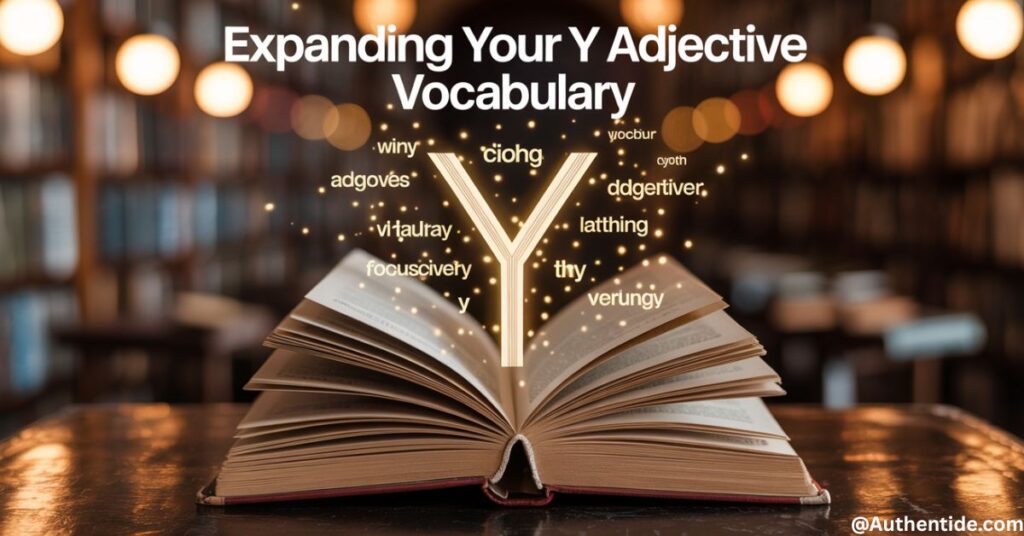
Comprehensive adjectives study requires systematic approach. Y vocabulary represents just one piece of the larger descriptive words puzzle.
Research Strategies
Dictionary exploration reveals forgotten Y adjectives. Historical dictionaries contain archaic terms like “yclept” that add period authenticity to historical fiction.
Etymology research uncovers connections between related words. Understanding that “yare” and “gear” share roots helps remember meanings.
Practice Exercises
Writing practice cements Y adjective mastery. Try describing the same scene using different Y words:
Version 1: “The young woman walked through the yellow field.” Version 2: “The youthful maiden strolled past yellowed wheat.” Version 3: “A yearning girl wandered among yawning grain rows.”
Each version creates different emotional resonance through adjective choice.
Reading for Inspiration
Professional authors demonstrate Y adjective mastery. Study how they integrate these words naturally. Notice rhythm, placement, and contextual appropriateness.
Genre differences affect Y adjective usage. Romance novels favor “yearning” and “youthful.” Mysteries might emphasize “yellowed” clues and “yawning” gaps in evidence.
Frequently Asked Question
What positive word starts with y?
Youthful is a great positive word that starts with Y! It suggests energy, vitality, and a fresh outlook regardless of actual age.
Other positive Y words include:
- Yes – shows agreement and positivity
- Yielding – flexible and accommodating (in a good way)
- Yearning – passionate desire or ambition
- Yummy – delicious and appealing
Which adjective starts with y?
Many adjectives start with Y! Here are some common ones:
Yellow – describing the color Young – having lived for a short time Youthful – having qualities of youth and vitality Yearning – showing intense longing or desire Yappy – talkative or prone to barking (for dogs) Yielding – giving way under pressure or being flexible
What words start with y for personality?
Youthful – energetic, vibrant, and optimistic Yielding – flexible, accommodating, and cooperative Yearning – passionate, ambitious, and driven by deep desires Yappy – talkative, chatty, and outgoing (though sometimes annoying) Yellow-bellied – cowardly or timid (though this is outdated slang)
Positive personality traits:
- Youthful spirit – someone who stays energetic and optimistic
- Yielding nature – adaptable and easy to work with
- Yearning heart – passionate and goal-oriented
Challenging traits:
- Yappy – talks too much or overshares
- Yielding – can also mean pushover if taken too far
How do you describe a person with the letter Y?
Physical appearance:
- Young – “She’s a young professional in her twenties”
- Youthful – “He has a youthful face that makes him look decades younger”
- Yellow-haired – “The yellow-haired child ran across the playground”
Personality traits:
- Youthful – “Her youthful enthusiasm lights up every room”
- Yielding – “He’s a yielding person who always compromises in arguments”
- Yearning – “She has a yearning soul that dreams of adventure”
Behavioral characteristics:
- Yappy – “My yappy neighbor loves to chat over the fence”
- Yes-oriented – “She’s a yes-person who rarely turns down requests”
Example sentences:
- “Tom is youthful and energetic despite being fifty”
- “Sarah’s yielding nature makes her perfect for teamwork”
- “The yearning artist spent hours perfecting her craft”
What is a cool word that starts with y?
Yonder is probably the coolest Y word! It means “over there” or “in the distance” and has this poetic, almost mystical quality.
“Look yonder at those mountains” sounds way more interesting than “Look over there.”
Other cool Y words:
Yearn – has deep emotional intensity Yielding – suggests graceful flexibility Yore – means “long ago” (as in “days of yore”) Yawning – when describing huge spaces, it’s dramatic (“yawning chasm”)
Yonder stands out because it’s both practical and romantic. You can actually use it in conversation without sounding pretentious, but it adds this old-world charm that makes everything sound more epic.
Conclusion: Mastering Y Adjectives for Better Writing
Y adjectives offer writers powerful tools for expressive writing. From character development to atmospheric description, these words that start with Y enhance communication effectiveness.
Vocabulary expansion takes time and practice. Start incorporating one new Y adjective weekly into your writing. Notice how it changes sentence rhythm and meaning.
Grammar confidence grows through understanding these descriptive words thoroughly. Know their connotations, comparative forms, and appropriate contexts. This knowledge prevents writing issues and improves overall communication.

Your go-to place for smart synonyms and celebrity updates. Muhammad Hassan Abid is dedicated to creating useful, engaging content that informs, inspires, and truly serves your curiosity

